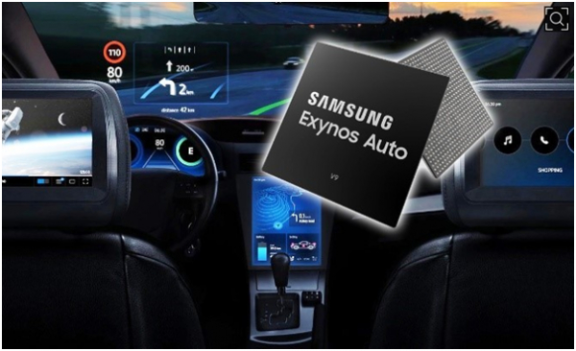Samsung Electronics Developing 5-nm Semiconductors for Tesla’s Self-driving Cars

The Exynos Auto V9, an automotive chip Samsung Electronics is supplying to Audi
Samsung Electronics’ Foundry Business Division is currently developing 5-nm system semiconductors for Tesla’s self-driving cars.
Samsung Electronics has thus far been supplying 14-nm chips produced using argon fluoride (ArF) photolithography to Tesla. Yet the two companies are expanding their cooperation to in-vehicle infotainment (IVI) products loaded with 5-nm semiconductors.
IVI products uses various semiconductors such as processors, neural network processing units (NPUs), security integrated circuits, memories, and display drive ICs (DDIs). As they process information coming from sensors, lights, and communication devices in vehicles and show it on a display, they are an essential technology to reach full autonomous driving. In particular, the power of chips in IVI products is expected to become more important as a 6G development race has begun in the United States, China, and Europe.
Tesla has been leading the field of self-driving cars. The electric vehicle giant needs Samsung Electronics’ technology. It is planning to upgrade IVI products to make its cars “smartphones on wheels.” Samsung Electronics is currently focusing on increasing yields of semiconductors per wafer. If a chip developed by Samsung Electronics satisfies Tesla, Samsung Electronics will raise the yields for volume production and both companies will sign a contract.
Samsung Electronics’ recent reorganization of human resources in the vehicle semiconductor field was designed to enhance technological capabilities and stabilize yields to sign a deal with Tesla, analysts say. At the end of last year, Samsung Electronics transferred engineers in the Advanced Driving Assistance System (ADAS) sector to the IVI sector. If Samsung Electronics succeeds in mass-producing products for Tesla, it will be able to attract much attention from other carmakers. Taiwan’s TSMC, the world’s No. 1 foundry company, unveiled the world’s first 7-nm automotive semiconductor design platform in May 2020. To outrun TSMC, Samsung Electronics skipped development of 7-nm vehicle chips and started to develop 5-nm products.